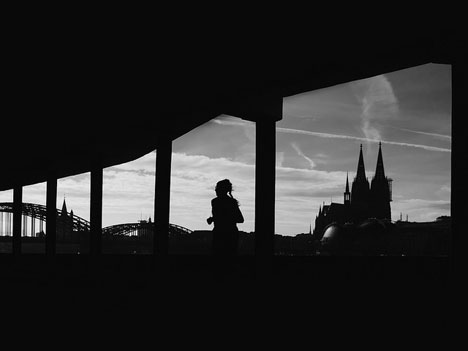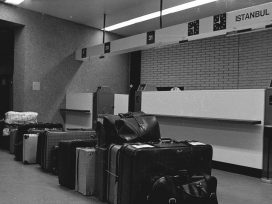At first it looked as if women’s rights in Germany had finally received some attention. Everyone was upset about the ugly events in Cologne on New Year’s Eve. The ensuing outcry showed public opinion to be firmly in favour of defending these rights. Even if – or just because – it took a while until it was reported in the media, within a few days it became the hottest of issues: the mob sexual harassment (including rapes), as well as assaults of various kinds, of over 500 women around Cologne’s cathedral.

Photo: Chris Wolcott. Source: Flickr
Now it seems that the delay in reporting the truth about the attacks was the result of police and media favouring political correctness over women’s rights. Even now, it is not clear how many assailants there were – the reports vary from several hundreds to two thousand – but it is clear that they were young men of, in police parlance, “Arab and north-African appearance”. Subsequent investigations confirmed that many of them were asylum seekers too. Could it be that in the country that welcomes refugees, it would be ugly to report on their aggressive behaviour? Either way, as usual, women’s rights came second. Moreover, when Cologne mayor Henriette Reker warned that young women should be more careful with whom they associate, it only add fuel to the fire. Neither did the prompt sacking of Cologne’s police chief help calm the uproar.
When information about the appearance of the assailants hit the news, it was as if a bomb exploded – there was soon a palpable change of tone, of atmosphere, of language about refugees and immigrants. After the social media buzz hit the mainstream media, women’s rights suddenly and very unexpectedly became the political issue – moreover, a symbol, a cause worth fighting for.
The German feminist Alice Schwarzer warned in Emma earlier last year of the differences between the patriarchal Muslim culture in the countries of origin of these young men, and the culture of human rights and equal rights for women they find in Germany or Europe. They should adjust to our values, otherwise the clash could produce a dangerous situation, wrote Schwarzer, probably having in mind precisely what happened in Cologne. But then she was not being politically correct, she was even called a racist. While today, in the new situation, women and their rights are written all over the Pandora’s box that’s been thrown open.
However, the main issue soon turned out to be not the sexual assault of women per se, but the fact that they were attacked by refugees and immigrants. What Schwarzer calls “zero tolerance of misogynistic Islamists” is quickly turning into zero tolerance of people of “Arab and north-African appearance”.
The German authorities have been forced to react to Cologne. Rather soft-sounding statements abound about the education of these foreigners, introducing more police surveillance, the deportation of those who commit crime, etc. Moreover, the whole issue is becoming a European affair. Other cities, like Hamburg and Frankfurt – as well as other countries like Sweden, Finland, Austria, Switzerland – keep coming up with the same stories, the same kind of assaults, as if it was a well kept dirty secret. Slovakian prime minister Robert Fico is calling for an extraordinary EU summit.
The last of Germany’s allies, Sweden, is also trying to curb the flow of refugees at the border with Denmark, having accepted 160,000 asylum seekers during the past year. The fact is, Angela Merkel’s policies cannot succeed as long as Germany is surrounded by countries that reject the idea of welcoming refugees. The mood in the rest of Europe, especially in the East, has been in flux ever since the refugee crisis began. If German citizens turn against Merkel and openly voice their opposition, her chances of success are even slimmer. Merkel herself speaks in rather mild terms about the Cologne assaults, but how else could she speak when she is the one who opened the door of Germany and Europe? Above all, she has to defend herself and her policy, therefore the statement about asylum seekers who commit crimes being deported seems a bit out of tune with the seriousness of this situation.
In fact, Merkel now has to worry about whether women’s tears will bring the same order of change to her policy that they brought to the tone of debate in the media and among the general public. Now the information that the assailants were of immigrant origin is no longer censored, the tears of Cologne women could indeed swing the mood not only in Cologne but in Germany. In post-Cologne opinion polls, one third of citizens claim to be afraid going out at night. And no politician is going to go against the general mood.
It seems that all kinds of voices are united in defending women’s rights and the European values they symbolize. As if, by sad coincidence, the perfect excuse to stop immigration has been found – an excuse nobody could be against. As if white Europeans are not assaulting, harassing, raping women themselves. The hypocrisy of this argument is evident. It is enough to remind crusaders to look at the statistics: 25 per cent of women in Germany will experience domestic violence in their lifetime. Besides, most women are beaten and raped by someone they know, a man close to home.
Was this uproar unexpected? Or perhaps one should ask this question in a different way: was it not surprising that French citizens mourned the victims of the Paris terrorist attacks so very, very quietly, bringing flowers to the Bataclan theatre and defiantly walking the streets – but that then many of them cast a vote for Marie Le Pen? Is it not surprising that the fear of political incorrectness in Germany, and the resulting absence of real discussion about refugee policies, backfires in such an ugly way?
No, there is no surprise at the frustration and fear that has accumulated ever since the moment masses of refugees started to stream into Europe in what seems like an exodus, followed by shootings and bombings (even if executed by home-grown Islamists) and the deaths of 130 people in Paris. And no surprise that this frustration and fear has finally found its way into the public sphere. The reason why the Cologne assaults have been blown up is, unfortunately, not because of women, but only because the perpetrators come from different backgrounds and have a different skin colour.
And women? It is clear that women are being used. Therefore, they are now at the forefront of another battle. Realizing that their rights are only a fig leaf for political and racist protests and demands, they are trying hard to push the gender question to the fore of the ongoing debate. But the fact that in Europe they have rights that should be respected by all men of all colours and cultures is already lost in the heat of the fire.
Extremist groups on the Right are ready to “cleanse” Cologne, Germany and Europe. In fact, they are already attacking immigrants. It may be that the tears of these young girls, used as arms against immigrants, will bring bigger changes to Germany and Europe than anyone could have expected, least of all the women themselves.







